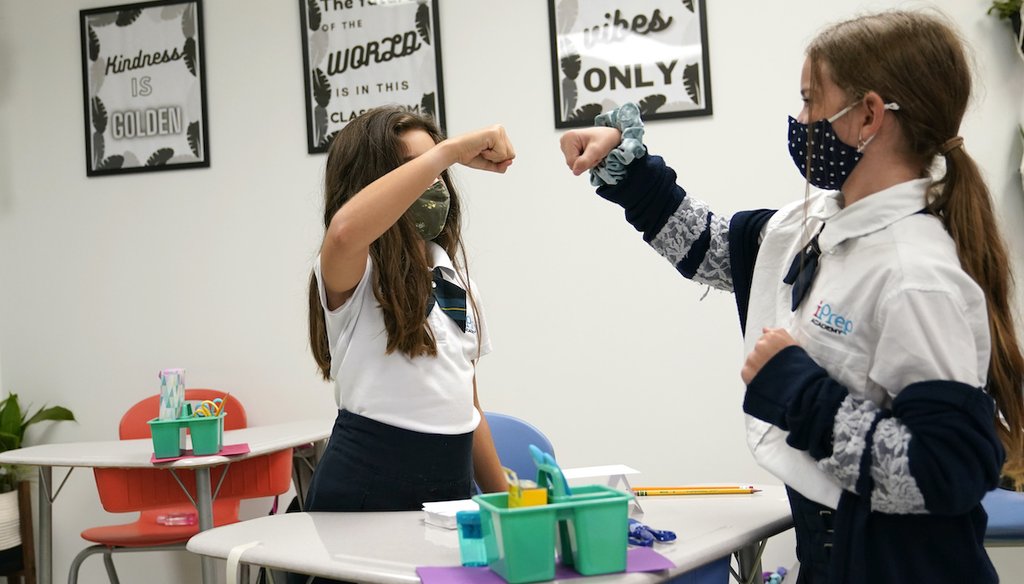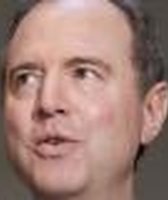Stand up for the facts!
Our only agenda is to publish the truth so you can be an informed participant in democracy.
We need your help.
I would like to contribute

Students Sofia Senra, left, and Emma Orell, right, bump fists as they work on a lesson together at iPrep Academy on the first day of school, Monday, Aug. 23, 2021, in Miami. (AP)
If Your Time is short
-
An advisory panel for the Food and Drug Administration met Oct. 26 and voted to recommend the Pfizer COVID-19 vaccine for children ages 5-11. The CDC could sign off on the vaccine in early November.
-
The FDA found that about 22% of cases reported to date occurred in people younger than 18, with about 9% occurring among 5- to 11-year-olds. As of mid-October, about 700 children had died from COVID-19, 146 of them ages 5-11.
-
Pediatricians say while COVID-19 is less deadly among children than adults, they will still benefit from the protection of the vaccine.
The United States is closer than ever to providing COVID-19 vaccines to 28 million people who so far have been unable to access protection from the pandemic that has upended their lives: children ages 5 to 11.
People in that age group were at the center of Food and Drug Administration discussions Oct. 26 when an advisory panel voted to recommend the Pfizer COVID-19 be made available to them.
But as federal officials moved through the final stages of approving the vaccine for elementary-age kids, some parents and advocacy groups expressed doubt about its need.
The gist of their concern: Children do not die or become seriously ill from COVID-19 at the same rate as adults. Why do they need to be vaccinated?
Experts say the reasons are numerous.
"Just because COVID-19 is sickening and killing fewer children than adults does not mean that children are or have been free from risk," wrote Lee Savio Beers, president of the American Academy of Pediatrics, in a New York Times op-ed.
Sign up for PolitiFact texts
It’s true that most children have been spared the worst of the disease. The FDA said that about 22% of cases reported to date occurred in people younger than 18, with about 9% occurring among 5- to 11-year-olds.
As of mid-October, about 700 children had died from COVID-19, 146 of them ages 5-11. The percent of child cases ending in death equals about 0.01%, according to the American Academy of Pediatrics.
And while that seems small, the numbers ignore that child deaths are always rare, from any cause. COVID-19 is less deadly and serious for children than adults, but it has become one of the leading causes of death for kids in 2021. Vaccination protects not only children but the communities in which they reside. Vaccination along with other precautions offer the best hope children and families have to return to more normal lives and routines, including uninterrupted schooling.
Following the FDA’s vote, a panel at the Centers for Disease Control and Prevention will meet Nov. 2 and 3 to advise CDC Director Dr. Rochelle Walensky, who will make the final determination. If approved, the vaccines could be available at pediatricians’ offices, pharmacies, hospitals and elsewhere as soon as the first week in November.
Kaiser Family Foundation’s September survey found that about one-third of parents of children ages 5 to 11 will vaccinate their child "right away" once a vaccine is authorized for their age group. Nearly half of parents said their children ages 12-17 had received at least one dose of the vaccine.
Low number of deaths isn’t a reason to skip the vaccine
"There is simply not an acceptable number of child deaths when such effective and safe preventive treatments are available," wrote Beers, a professor of pediatrics at Children’s National Hospital. "So, for the same reason pediatricians recommend seatbelts and car seats, we are recommending vaccines for COVID-19."
That widespread recommendation for children to wear seatbelts continues even though there aren’t high numbers of deaths. In 2019, 608 child passengers age 12 and younger died in motor vehicle crashes, according to the CDC. (Of the children for whom restraint use was known, 38% were not buckled up.)
"The good news is that kids ages 5-11 years of age don't die very often of anything (thank goodness)," said Dr. Sonja Rasmussen, a professor in the departments of pediatrics and epidemiology at the University of Florida. "But COVID-19 has been in the top 10 causes of deaths for 5-14 year olds for most of 2021. I think that suggests that if there is a safe and effective vaccine that can prevent these cases, I'd want my child to get it."
The vaccine data shows that the vaccine is safe. Dr. Ashish K. Jha, dean at Brown University School of Public Health, tweeted that he will get his 9 year old vaccinated: ‘"In the trial, they reduced infections by 91%. That's during time when delta variant was widespread. Safety data also compelling. You see standard stuff of course: sore arm, headache, low grade fever after the vaccine. But nothing serious."
Many children ages 12 and older have gotten the vaccine. (Pfizer’s vaccine for children is one-third of the dose of vaccine for older children and adults).
"These vaccines have been given to half of all humanity (3.8 billion folks)," Jha tweeted. "They are among the most closely studied vaccine in history. 15 million kids in the U.S. have already been given the Pfizer vaccine."
Beers wrote that the most common question she receives about the vaccine and children is about myocarditis, an inflammation of the muscle of the heart.
"First, the risk of developing myocarditis after a Covid-19 infection is much higher than the risk of developing myocarditis after the vaccine," she wrote. "Second, almost all the cases of myocarditis after the vaccine are mild, and people generally get better quickly. Vaccinating my children was an easy choice knowing that the risk of COVID-19 to children is far greater than the risk of the vaccines."
When children get COVID-19, they miss school. In order to stem the spread of infection, many schools require children who test positive for COVID-19 to quarantine at home for several days. Some schools offer temporary remote options for children quarantining. Some don’t. Some parents have an option to work from home with a quarantined child. Others don’t.
Even when children have mild cases, their quarantine disrupts learning and inconveniences families with ripple effects for employers.
"If vaccination helps avoid quarantine, then it prevents the loss of instruction associated with quarantine times which can be substantial," said Amanda VanDerHeyden, founder of a math intervention program for K-12, SpringMath. "Learning loss was a documented effect of altered instructional schedules and formats for most children and especially for children who were perhaps more susceptible to the negative effects of virtual instruction."
RELATED VIDEO
Vaccinating children will help protect the U.S. at large. Doctors say there is a "me" to vaccination — meaning protect yourself or your child — and a "we" to vaccination — protecting the community at large. That applies to COVID-19 vaccines for children, too. This is why schools have long required vaccinations to enter kindergarten, and more than 94% of children comply. Vaccines help protect those who aren’t yet vaccinated, which in this case would include children younger than five years old.
"Vaccinating children quickly will improve our odds of emerging from this crisis sooner," wrote Angela L. Rasmussen, a virologist at Georgetown University, and Dr. Jeremy Samuel Faust at Brigham and Women’s Hospital Department of Emergency Medicine.
Vaccinating children also protects older people from illnesses.
"We know that when we started immunizing children with pneumococcal vaccines, the death rate not only went down in children, but in their elederly grandparents as well — that immunizing children protects family members and loved ones in a household," said Dr. Mark Schleiss, professor of pediatrics at the University of Minnesota Medical School.
RELATED: COVID-19 far less dangerous to kids, but wrong to say they ‘are not affected’
RELATED: Doubts raised over preprint study regarding myocarditis risk in teenage boys
Our Sources
American Academy of Pediatrics, Children and COVID-19: State-Level Data Report, Oct. 21, 2021
American Academy of Pediatrics, Study: Myocarditis risk 37 times higher for children with COVID-19 than uninfected peers, Aug. 31, 2021
Food and Drug Administration, Briefing document about COVID-19 vaccine for children, Oct. 26, 2021
New York Times op-ed by Dr Lee Savio Beers, president of the American Academy of Pediatrics, Vaccines for Young Kids May Be Coming. An Expert Explains Why That Matters. Oct. 26, 2021
New York Times op-ed by Jessica Calarco, professor of sociology at Indiana University, ‘There’s Almost No Incentive at All to Give Him the Vaccine.’ Oct. 25, 2021
New York Times op-ed Dr. Sonja Rasumussen at University of Florida and Dr. Jeremy Samuel Faust at Brigham and Women’s Hospital Department of Emergency Medicine, We Can’t End the Pandemic Without Vaccinating Kids, March 29, 2021
Kaiser Family Foundation, KFF COVID-19 Vaccine Monitor: Vaccination Trends Among Children And COVID-19 In Schools, Sept. 30, 2021
Kaiser Family Foundation, COVID-19 continues to be a leading cause of death in the U.S. in August 2021, Aug. 27, 2021
Kaiser Family Foundation, COVID-19 continues to be a leading cause of death in the U.S. in September 2021, Oct. 13, 2021
U.S. Centers for Disease Control and Prevention, Vaccination Coverage with Selected Vaccines and Exemption Rates Among Children in Kindergarten — United States, 2018–19 School Year, Oct. 18, 2019
Vanderbilt University, Infant vaccine for pneumonia helps protect elderly, July 11, 2013
Dr. Ashish Jha, dean of the Brown University School of Public Health., Twitter thread, Oct. 2021
Email interview, Dr. Mark Schleiss, professor of pediatrics at the University of Minnesota Medical School, Oct. 26, 2021
Email interview, Dr. Sonja Rasumussen, a professor in the Departments of Pediatrics and Epidemiology at the University of Florida, Oct 26, 2021
Email interview, Cynthia Cox, vice president, director, Program on the ACA director, Peterson-Kaiser Health System Tracker Project, Oct. 26, 2021
Twitter message, Amanda VanDerHeyden, founder of SpringMath, Oct. 26, 2021




































